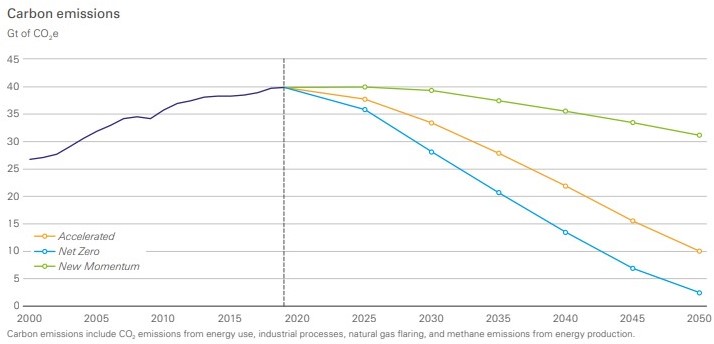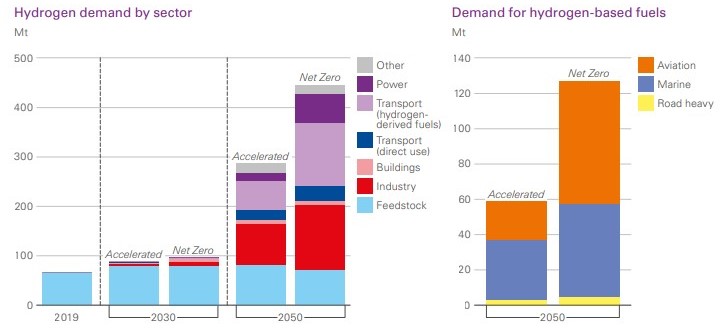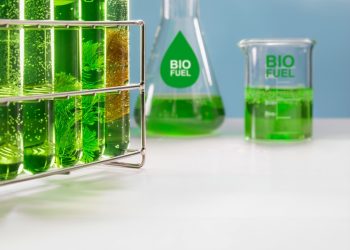BP’s Energy Outlook 2022 explores the key uncertainties surrounding the energy transition and is focussed on three main scenarios: Accelerated, Net Zero and New Momentum.
The Outlook aims to identify aspects of the energy transition which are common across the main scenarios and provide a guide as to how the energy system may evolve over the next 30 years.
Key themes from Energy Outlook 2022
#1 The carbon budget is running out: CO2 emissions have increased in every year since the Paris COP in 2015, except in 2020. Delaying decisive action to reduce emissions sustainably could lead to significant economic and social costs.
#2 Government ambitions globally have grown markedly in the past few years: This points to new, increased momentum in tackling climate change. But there is significant uncertainty as to how successful countries and regions will be in achieving those aims and pledges.
#3 The structure of energy demand changes: The importance of fossil fuels is gradually declining, replaced by a growing share of renewable energy and increasing electrification. The transition to a low-carbon world requires a range of other energy sources and technologies, including low-carbon hydrogen, modern bioenergy, and carbon capture, use and storage (CCUS).
#4 The movement to a lower carbon energy system leads to a fundamental restructuring of global energy markets: With a more diversified energy mix, increased levels of competition, shifting economic rents, and a greater role for customer choice.
#5 Oil demand increases to above its pre-COVID-19 level before falling further out: Declines in oil demand are driven by the increasing efficiency and electrification of road transportation. Natural declines in existing hydrocarbon production imply continuing investment in new upstream oil and gas is required over the next 30 years.
#6 The use of natural gas is supported, at least for a period, by increasing demand: This happens in fast-growing emerging economies as they continue to industrialize and reduce their reliance on coal. Growth in liquefied natural gas plays a central role in increasing emerging markets’ access to natural gas.
#7 Wind and solar power expand rapidly: They account for all or most of the increase in global power generation, underpinned by continuing falls in their costs and an increasing ability of power systems to integrate high concentrations of variable power sources. The growth in wind and solar power requires a substantial increase in the pace of investment in both new capacity and enabling technologies and infrastructure.
#8 The use of modern bioenergy increases substantially: This provides a low-carbon alternative to fossil fuels in hard-to-abate sectors.
#9 The use of low-carbon hydrogen increases: As the energy system progressively decarbonizes, it carries energy to activities and processes which are difficult to electrify, especially in industry and transport. The production of low-carbon hydrogen is dominated by green and blue hydrogen, with green hydrogen growing in importance over time.
#10 Carbon capture plays a central role: It supports a low-carbon energy system: capturing emissions from industrial processes, providing a source of carbon dioxide removals, and abating emissions from fossil fuels.
#11 Carbon dioxide removals: Several carbon dioxide removals, including bioenergy combined with carbon capture and storage, natural climate solutions, and direct air capture with storage, may be needed for the world to achieve a deep and rapid decarbonization.

Hydrogen
The use of hydrogen grows significantly in Accelerated and Net Zero as the world transitions to a low-carbon energy system, increasing more than four-fold in Accelerated and seven-fold in Net Zero by 2050:
- The growth of hydrogen over the first ten years of Accelerated and Net Zero is relatively modest, driven by the increasing use of low-carbon hydrogen as a feedstock, albeit constrained by the long lead times for low-carbon hydrogen projects to come online at scale.
- The pace of growth accelerates sharply in the 2030s and 2040s as falling costs of production and tightening carbon emission polices allow low-carbon hydrogen to compete against incumbent fuels. In particular, the expanding use of lowcarbon hydrogen complements the growing electrification of the energy system in Accelerated and Net Zero, providing a source of low-carbon energy for activities and processes which are difficult to electrify, especially in industry and transport, as well as being a source of flexibility for power system stability.
- The use of hydrogen in industry is concentrated in parts of heavy industry, such as iron and steel, chemicals, and cement, which rely on high-temperature processes. By 2050, hydrogen accounts for 5-10 % of total final energy used in industry in Accelerated and Net Zero.
- The greatest use of hydrogen within the transport sector is to help decarbonize long-distance transportation, especially within marine (in the form of ammonia, methanol and synthetic diesel) and aviation (in the form of synthetic jet fuel). The production of these H-fuels account for around 75-80% of the hydrogen used within the transport sector by 2050 in Accelerated and Net Zero. The remainder is used directly in heavy-duty road transport and, to a much lesser extent, rail. By 2050, H-fuels and hydrogen account for around 5-15% of total final energy used by the transport sector in the two scenarios.
- The relatively high costs of transporting hydrogen means that most of the hydrogen is produced and consumed within regions, although some inter-regional trade develops over the outlook in Accelerated and Net Zero, with exports from regions with advantaged production, including the Middle East, Russia, South & Central America and Africa, flowing to developed Asia and the EU.
































































